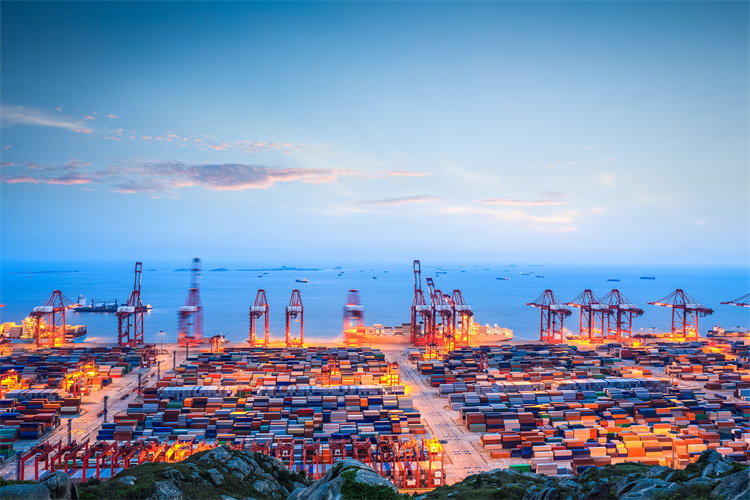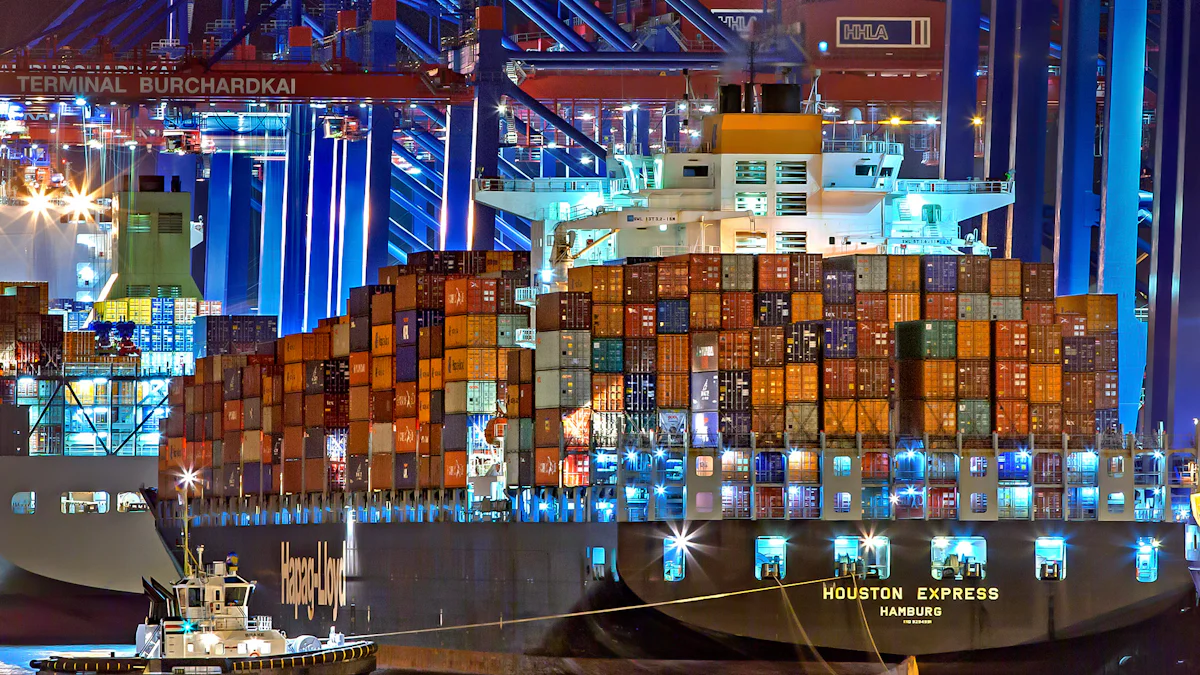The Complete Guide to Modern Freight Solutions

The freight solutions industry plays a pivotal role in today's global economy, witnessing significant growth year by year. From $16.71 billion in 2023 to $17.58 billion in 2024, the market size is projected to reach $21.82 billion by 2028 at a steady CAGR of 5.5%. This evolution mirrors advancements in transportation and technology, transforming ancient methods into modern digital solutions. One notable milestone was the invention of the first successful steamboat in 1787, revolutionizing freight shipping practices globally.
Understanding Freight Solutions
Definition and Scope
Freight Solutions:
Freight solutions have evolved into finely-tailored services that extend beyond mere transportation. They serve as crucial partners within the global supply chain, ensuring seamless logistics solutions amidst intricate international trade regulations.
Types of Freight Solutions:
Finely-Tailored Freight Solutions: These solutions are designed to streamline shipping operations, providing reliability, efficiency, and cost-effectiveness.
FreightCenter Services: Explore the platform to simplify your shipping needs and experience firsthand the difference in service quality offered by FreightCenter. Request a quote today for tailored freight solutions that meet your specific requirements.
Key Components of Modern Freight Solutions

Technology Integration
Role of IoT in Freight
Innovative IoT technologies have revolutionized the freight industry by enabling real-time monitoring of vehicles and assets, optimizing fleet management, and enhancing decision-making processes. This integration ensures efficient operations and improved customer satisfaction.
Use of AI and Machine Learning
The utilization of AI and Machine Learning in modern freight solutions has significantly enhanced customer support services within logistics. These technologies meet customer demands effectively, ensure timely and secure delivery of goods, and provide valuable real-time visibility throughout the supply chain.
Transportation Modes
Road Freight
Road freight remains a cornerstone in the transportation industry, offering flexible and reliable shipping solutions for various cargo types. With extensive road networks globally, this mode of transport provides direct access to many destinations, ensuring efficient delivery.
Rail Freight
Rail freight services play a vital role in transporting goods across vast distances with efficiency. The use of block trains for full-container and less-than-container-load services enhances operational effectiveness while maintaining cost-efficient transportation solutions.
Air Freight
Air freight stands out as a fast and reliable mode of transportation for time-sensitive shipments. Leveraging established route networks and cost optimization strategies, air freight ensures swift delivery while adapting to seasonal demands seamlessly.
Sea Freight
Sea freight offers a cost-effective solution for transporting large volumes of goods over long distances. With stable space allocation on international maritime routes, sea freight provides global reach with multiple transport modes like FCL and LCL for diverse shipping needs.
Logistics and Supply Chain Management
Importance of Efficient Logistics
Efficient logistics operations are crucial for the seamless movement of goods from origin to destination. By optimizing supply chain processes, businesses can reduce lead times, minimize costs, and enhance overall customer satisfaction through timely deliveries.
Strategies for Effective Supply Chain Management
Implementing effective supply chain management strategies is essential for businesses to streamline operations and maximize productivity. By focusing on inventory management, demand forecasting, and supplier relationships, companies can achieve operational excellence while meeting market demands efficiently.
JUSDA's Comprehensive Freight Solutions
Air Freight
Route Network and Cost Optimization
JUSDA's air freight services boast a well-established route network that includes mature routes like China-Mexico-US and Vietnam-US, with plans for new routes such as China-India. This strategic network ensures efficient and timely deliveries across various regions.
The company excels in cost optimization by utilizing Block Space Agreements (BSA) and external resources to adapt swiftly to seasonal fluctuations. This approach not only enhances cost efficiency but also guarantees consistent service quality.
Operational Efficiency and Service Enhancement
Operational efficiency is a hallmark of JUSDA's air freight services, particularly at main gateway and inland airports. By focusing on streamlined processes, the company ensures quick turnaround times and minimal delays, meeting customer expectations effectively.
JUSDA enhances its services through continuous service enhancement, leveraging government subsidies and cost advantages in inland airport layouts. These enhancements translate into improved service quality, making the company a reliable partner in air freight logistics.
Product Innovation
At the forefront of innovation, JUSDA is committed to product innovation in air freight solutions. By developing standard air freight products for key routes like China-India and China-Europe, the company caters to evolving market demands with tailored shipping options. Plans for new routes further showcase JUSDA's dedication to pioneering solutions in the industry.
Rail Freight
Service Specialization and Intermodal Transport
In rail freight services, JUSDA stands out for its commitment to service specialization through full-container and less-than-container-load offerings via China-Europe block trains. This specialized approach ensures efficient handling of diverse cargo types while maintaining high service standards.
The company excels in intermodal transport, facilitating international Eurasian sea-rail intermodal transport alongside domestic multimodal solutions. By integrating different modes of transportation seamlessly, JUSDA provides comprehensive shipping options tailored to specific customer needs.
Real-time Monitoring and Strategic Partnerships
Real-time monitoring is a core feature of JUSDA's rail freight operations, allowing for precise tracking of temperature and humidity levels throughout the journey. This proactive approach ensures cargo safety and integrity during transit, providing customers with peace of mind.
Through strategic partnerships with key train platforms, JUSDA secures stable carriage capacity essential for uninterrupted rail freight services. These collaborations enhance operational reliability while expanding the company's reach across diverse markets.
Experience and Coverage
With over ten years of experience in rail freight operations, JUSDA brings a wealth of expertise to every shipment. The company's extensive experience spans over 30 countries across Eurasia, reflecting its deep-rooted presence in the global logistics landscape.
Extensive coverage is another strength of JUSDA's rail freight services, offering customers access to a wide network that ensures seamless connectivity between regions. This broad coverage underscores the company's commitment to delivering reliable transportation solutions worldwide.
Road Freight
Extensive Network and Multimodal Transport
JUSDA's road freight services are characterized by an extensive network covering major routes in South China, East China, and from Wuhan to Beijing. With over 800 trunk line services, the company provides comprehensive road transportation options tailored to diverse shipping requirements.
Emphasizing multimodal transport, JUSDA ensures 24/7 non-stop service coupled with cross-border road freight solutions to ASEAN countries. This integrated approach optimizes delivery timelines while offering flexible shipping choices for varying cargo volumes.
Tailored Solutions and Cost Reduction
Tailoring solutions to meet specific industry needs is a cornerstone of JUSDA's road freight offerings. By providing customized transport solutions for sectors like new energy vehicles and broad electronics, the company addresses unique logistical challenges with precision.
Cost reduction strategies form an integral part of JUSDA's road freight services through optimized consolidation practices and fleet capacity management. Leveraging overseas agency networks further enhances cost-efficiency measures while maintaining service excellence throughout the supply chain operationally
Ocean Freight
Global Reach and Stable Space Allocation
JUSDA's ocean freight services offer unparalleled global reach, connecting businesses to over 500 destinations worldwide through a network of more than 2,500 international maritime routes. This extensive coverage ensures reliable and efficient shipping solutions for diverse cargo requirements.
With a focus on stable space allocation, JUSDA guarantees consistent access to shipping capacity across various modes, including FCL and LCL options. By providing secure and stable allocations, the company ensures seamless transportation of goods with minimal disruptions.
Value-added Services and Cost Management
In addition to core shipping services, JUSDA's ocean freight solutions include a range of value-added services such as temperature-controlled transportation and special container options. These additional offerings cater to specific cargo needs, ensuring the safe and secure delivery of goods throughout the supply chain.
Through effective cost management strategies, JUSDA optimizes cargo volumes, implements pricing schemes, and leverages cost-saving measures to enhance overall operational efficiency. By consolidating shipments and implementing efficient pricing structures, the company delivers cost-effective solutions without compromising service quality.
Benefits of Modern Freight Solutions
Cost Efficiency
Reduction in Operational Costs
Streamlining operations leads to reduced expenses.
Enhancing efficiency minimizes unnecessary spending.
Optimizing logistics ensures cost-effective solutions.
Economies of Scale
Expanding operations results in lower average costs.
Increasing production volume reduces per-unit expenses.
Leveraging economies of scale enhances overall profitability.
Speed and Reliability
Faster Delivery Times
Improving transportation processes accelerates order fulfillment.
Enhancing route planning reduces transit durations significantly.
Implementing efficient logistics systems ensures timely deliveries.
Improved Tracking and Monitoring
Utilizing advanced technologies enhances shipment visibility.
Implementing real-time tracking systems boosts operational efficiency.
Enhancing monitoring capabilities guarantees reliable delivery timelines.
Environmental Impact
Sustainable Practices
Adopting eco-friendly measures minimizes carbon footprint.
Implementing green initiatives promotes environmental sustainability.
Incorporating sustainable practices reduces ecological impact.
Reduction in Carbon Footprint
Minimizing emissions contributes to a cleaner environment.
Implementing carbon reduction strategies mitigates environmental harm.
Reducing carbon footprint aligns with global sustainability goals.
Challenges in Implementing Modern Freight Solutions
Technological Barriers
High Initial Costs
Implementing modern freight solutions often requires substantial financial investment upfront.
Acquiring and integrating advanced technologies may pose significant initial expenses.
Overcoming the hurdle of high initial costs demands strategic financial planning and resource allocation.
Integration with Existing Systems
Adapting modern freight solutions to existing operational frameworks presents integration challenges.
Aligning new technological systems with established processes necessitates meticulous coordination.
Ensuring seamless integration with existing systems is vital for optimizing overall efficiency and performance.
Regulatory and Compliance Issues
International Trade Regulations
Navigating complex international trade regulations is a fundamental challenge in modern freight operations.
Complying with diverse regulatory frameworks across different regions demands comprehensive legal expertise.
Adhering to international trade regulations is essential for mitigating risks and ensuring smooth cross-border transactions.
Safety and Security Standards
Upholding stringent safety and security standards is a critical aspect of implementing modern freight solutions.
Ensuring compliance with industry-specific safety protocols and security measures is paramount.
Prioritizing safety and security standards safeguards assets, minimizes risks, and fosters trust among stakeholders.
Workforce Adaptation
Training and Skill Development
Enhancing workforce competencies through targeted training programs is essential for successful implementation.
Providing employees with specialized skill development opportunities fosters operational excellence.
Investing in continuous training initiatives empowers staff to navigate technological advancements effectively.
Resistance to Change
Addressing resistance to change within organizational structures poses a significant obstacle to innovation.
Overcoming inertia and fostering a culture of adaptability are crucial for embracing modern freight practices.
Encouraging openness to change cultivates a dynamic work environment conducive to sustainable growth.
Future Trends in Freight Solutions

Emerging Technologies
Autonomous Vehicles
The integration of autonomous vehicles into freight solutions heralds a new era of efficiency and reliability. These self-driving vehicles navigate roads with precision, optimizing delivery routes and minimizing transit times. By leveraging cutting-edge technology, companies can enhance operational productivity and meet evolving customer demands seamlessly.
Blockchain in Logistics
Blockchain technology revolutionizes the logistics landscape by providing secure and transparent data management solutions. Through decentralized ledgers, blockchain ensures the integrity of supply chain information, from origin to destination. This innovation streamlines processes, reduces inefficiencies, and fosters trust among stakeholders, shaping the future of freight solutions.
Market Dynamics
Globalization and Trade Policies
Globalization drives the expansion of trade networks, creating opportunities for businesses to access diverse markets worldwide. As trade policies evolve, companies must adapt to regulatory changes and market fluctuations efficiently. Navigating international trade regulations requires a deep understanding of compliance standards to facilitate seamless cross-border transactions.
Consumer Demand and Expectations
Consumer demand shapes the trajectory of freight solutions, emphasizing the need for personalized services and sustainable practices. Meeting consumer expectations necessitates agile supply chains that prioritize speed, reliability, and eco-friendly initiatives. By aligning with shifting consumer preferences, businesses can stay competitive in a dynamic market environment.
The evolution of freight solutions from traditional methods to modern, technology-driven systems has been pivotal in meeting the dynamic demands of global trade. As the industry continues to embrace innovative technologies like AI, IoT, and blockchain, businesses can expect enhanced efficiency, cost savings, and improved customer experiences. The future of modern freight solutions lies in autonomous vehicles revolutionizing supply chain activities and sustainable practices reducing environmental impact. Embracing these advancements will shape a more efficient and sustainable logistics landscape for years to come.
See Also
Revealing Top Global Logistics Companies: The Ultimate Guide
A Comprehensive Analysis of the Future of LTL Freight
Exploring Sustainable Transportation in Supply Chains: The Ultimate Guide
2024 Sea Freight Logistics Update: What's Been Unveiled?
Ready for the Future? Delving into the Latest Transport Technology for Supply Chains
